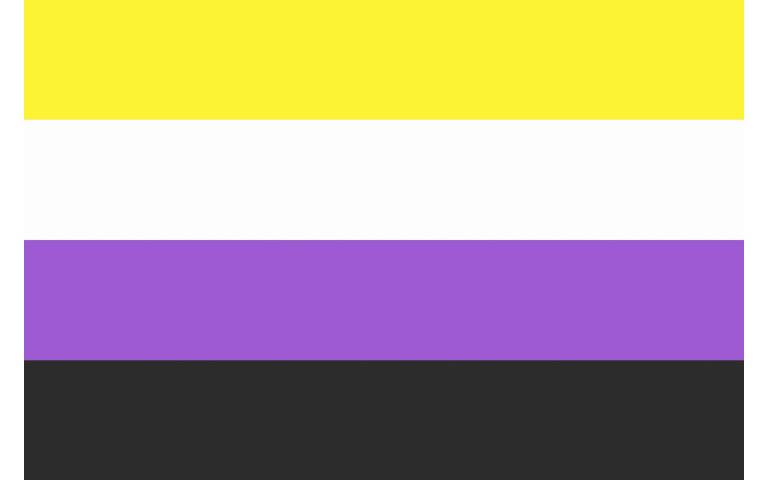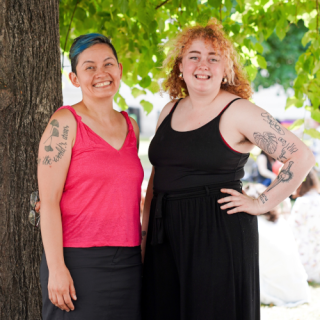International Non-Binary People’s Day – 14 July
13 July 2023
14 July marks International Non-Binary People’s Day, aimed at raising awareness of the issues that non-binary people face around the world. Find out more about what you can do to learn about diverse gender identities and create a more inclusive environment on campus.

An introduction from the Co-Chairs of UCL's Trans Network

I am very proud of who I have become. Being able to describe my identity as non-binary, for me, has been a freeing experience. Growing up in a very binary-gendered world caused a lot of heart ache and confusion for me, as I couldn't understand why I didn't "fit in" and feel like others. Realising I didn't have to fit to either side truly set me free. Nowadays, I try to see myself outside of the constraints of gendered terms by thinking about clothing, styles and other related things in terms of what is 'me', not what gendered ideals are tied to them. They're not anyone else's, but mine. Even if it's only me that knows this, that's better than no one at all.
– Jayne Flowers (they/them), UCL Trans Network Co-Chair
I'm Johanna Novales, they/them. At UCL, I'm the Equality, Diversity, and Inclusion Coordinator in the Faculty of Engineering; I also train Mental Health First Aiders, serve on the LGBTQ+ Equality Steering Group, and recently became a co-chair for the UCL Trans Network with the lovely Jayne. When I'm not at work, I'm a forager, cyclist, player of board games and tabletop role-playing games, sometime swing dancer, and trainee psychotherapist. I'm queer, a person of colour, and an immigrant.
I'm also nonbinary. I used to very strongly identify with being a girl and then woman. And eventually I realised I didn't have a gender at all. I had been quite content with being a non-stereotypical 'woman' – so it's not that I felt like that particular gender box didn't fit; it's that I don't feel like any gender box fits or calls to me. I don't feel the need for gender, and frankly, I don't miss it at all.
For me, being nonbinary is about freedom. Living in a world that increasingly acknowledges and supports gender expansiveness is a relief and a joy. I love seeing friends, family, and people all around me exploring their gender(s), whatever they may be and however they manifest.
That's my wish for everyone on this day, and every day: may you feel free to create and re-create and imagine and embody your gender(s) in all the ways you desire. And may we all feel comfortable enough with ourselves that we can hold space for others to do the same.
– Johanna Novales (they/them), UCL Trans Network Co-Chair
Allyship tips
While awareness of non-binary people in the UK (and other western countries) has increased in recent years, there is much more work to be done to increase our understanding of non-binary identities, dismantle stereotypes, and foster inclusivity on campus and beyond.
Here are some actions you can take to be an ally to non-binary colleagues and students:
Educate yourself on the rich history of non-binary people throughout time and different areas of the world
Often, people think of gender nonconformity as a new or western phenomenon; however, there is actually a superabundance of countries and cultures who have a long-standing history of recognising and even revering gender diversity. This map of diverse genders from PBS is a great starting point for researching this history. Recognising that non-binary people have always existed in one way or another can help to facilitate respect, encourage empathy, and uphold the validity of non-binary identities.
Consume a diverse range of media
Non-binary and trans people are often subject to much scrutiny, hostility, and misunderstanding; so a good way of broadening your perspective is to read content written by non-binary and transgender people, rather than media about them. Them.us and Pink News are two publications that might be of interest.
Raise awareness in your day-to-day life
You can do this by explaining the history and validity of gender diverse people to your friends, family, and colleagues. By debunking common myths and raising awareness, you can foster open-mindedness and respect within your networks, which will in turn become safer, more welcoming environments for non-binary people.
Also, by answering common questions, you can save non-binary people some of the emotional labour they face in having to constantly explain themselves, as well as the awkwardness of answering uncomfortable or unintentionally-invasive questions (for example, “what’s the name you were born with?” or “so, are you a man or a woman then?”).
Of course, if you don't have the answer to a certain question, don’t feel pressured to speak about it or try to explain it. Instead, it might be more effective to go away and research the topic as part of your own commitment to further learning. Once you do find further information, you can always share that with the person with whom you were having the discussion.
Include your pronouns in your email signatures, on Teams, or when introducing yourself in a meeting
You don’t need to be trans or non-binary to share your pronouns; in fact, by normalising the practice, you’re helping to create a positive atmosphere where non-binary or trans people (who are often misgendered) can feel more comfortable sharing their pronouns. This helps us to avoid making assumptions based on appearances and ensures that everyone’s pronouns are respected.
A recent Microsoft update means you can add your pronouns to your Microsoft Teams profile. Of course, adding pronouns to your profile or signature is completely optional. For more information, you can read this article about pronouns and their positive impact.
Respect other people’s pronouns
When speaking about an individual and their work, ensure you use the correct pronouns. If you make a mistake and someone corrects you, don’t panic, just briefly apologise and try your best to use their correct pronouns in future.
If you notice someone else making a mistake, depending on the context and your relationship with the person, you could politely correct them either directly or indirectly.
A good tip for encouraging respectful pronoun usage is, if you know someone uses ‘they/them’ pronouns, don’t shy away from using them in conversation when discussing them or their work. This helps to get you into the habit of correctly gendering the person, as well as encouraging others to do the same. UCL's pronouns guidance has some more information.
Embed inclusivity in your day job
This can be done in so many ways depending on your role. If you’re an administrator, you might want to ensure your databases have gender neutral titles (such as Mx). If you work in communications, you might want to spotlight stories from non-binary students or staff members to increase visibility. If you want ideas on where to start, speak with your local EDI committee or Inclusion Lead.
Familiarise yourself with the UCL policies and commit to challenging unacceptable behaviour
The university has guidance around recognising and challenging transphobic behaviour which encompasses support for non-binary people. Ensure you're familiar with spotting harmful behaviour and if you experience or witness discrimination or harassment, please use Report + Support. Remember that we can all play a role in creating a safer, more compassionate, and inclusive campus.
Myth busting
“The biggest joy of being non-binary is that I am free from assumptions about how I should behave based on gender, so I'm comfortable in my own skin in a way I never thought I could be. Some things I wish people knew: Non-binary isn't woman-lite, or being any "less" or "more" of being a man or a woman - it's a separate category, and feeling, altogether. It's the feeling that if genders were shoes, neither the "man" or "woman" shoe quite fits, and feels uncomfortable. Non-binary people can get dysphoria too! I have felt a horrible pit in my stomach from being called one of the "ladies" out of nowhere, and it genuinely throws me off from whatever I was doing at the time. I would prefer it if people didn't use gendered language around me, but I understand that it can be difficult. – Alexis Low, Institute of Neurology
“For me the ‘joy’ is more relief. I’ve never felt male (or female) and my feelings about my gender are, to paraphrase Dylan Moran, ‘I cannot begin to describe how much I don’t care’. Over the years I’ve learned to dodge conversations e.g. about ‘all men use porn’ (nope) and so on. It was a relief to get affirmation that I didn’t need to care. But to assert it (e.g. by wearing skirts) would make it more of a big deal than it is for me, so I have sort of gone full circle and dress as a man and use male pronouns to remain invisible as nonbinary. Because the thought of having to explain something I am utterly indifferent to makes me want to scream. I guess that’s also something I wish more people understood, that it can constitute entirely as a lack of gender (but that’s only one manifestation). – 54 year old white ‘man’, Associate Professor (Teaching)
Further reading
- UCL's 'Pronouns at work' guidance
- Allyship guidance from NCTE
- More information, including videos on gender euphoria and actions for allyship
- Students' Union UCL's Gender Expression Fund
- How to join UCL's Trans Network (for staff and students)
 Close
Close

